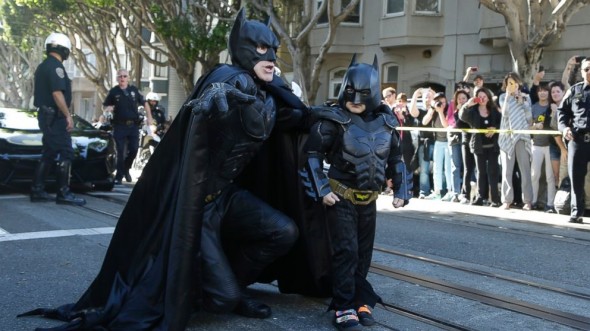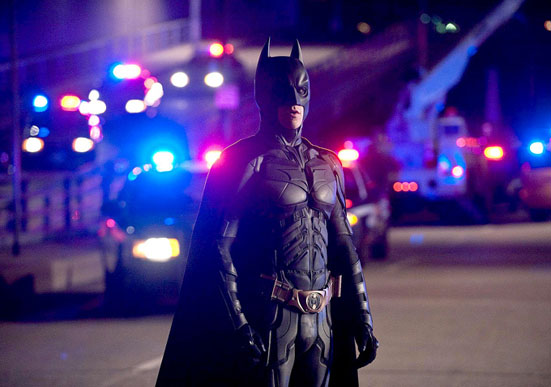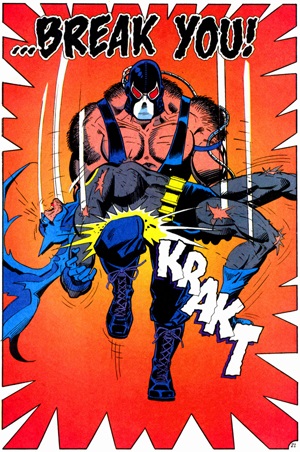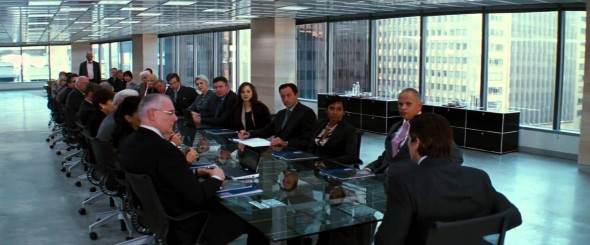A special thanks to Matt Crespi for his help in writing this article.
Batman Begins is the story of how Bruce Wayne Became Batman. The story is familiar – billionaire’s parents are killed; goes on quest for vengeance; becomes a ninja; uses his wealth to become a costumed superhero with a bunch of awesome gadgets.
There’s a scene relatively early on in the film that’s always stood out to me – young Bruce Wayne is in a rage, and he confronts Carmine Falcone in a bar. Falcone pulls out a gun and tells Wayne that he could shoot Wayne right then and there, and all his money can’t do anything about it. And in the minute, Falcone may be right – the mobster has the network and connections to coverup a brazen murder, even of someone like Bruce Wayne.
![Batman-Begins-Carmine-Falcone[1]](https://www.overthinkingit.com/wp-content/uploads/2014/10/Batman-Begins-Carmine-Falcone1-590x245.jpg)
But at the same time, you have to wonder about the wisdom of Falcone’s pissing off someone like Bruce Wayne and then just letting him go. Forget the whole Batman thing for a minute – Wayne is a billionaire, and money talks.
Estimates of the Wayne fortune vary, but we can safely put it in the neighborhood of $5B-$10B. So he’s not Gates or Buffet level rich. But how does that compare with someone like Carmine Falcone? According to this estimate, $10B would be substantially larger than all but one of the biggest criminal ORGANIZATIONS in the world, much less the richest CRIMINALS. And remember, Falcone is a big wheel in Gotham but it’s still just Gotham as far as we know – it’s unlikely that the mob boss of a single city would get anywhere close to Wayne’s billions.
Falcone insists that “fear” is what makes real power, but money is pretty good too – how many of Falcone’s men would betray him for the $10M (or $20M, or $30M) bounty that Wayne could put out on his head without breaking a sweat? I made this observation to one of my best friends from college, and it got us to thinking: why DOESN’T Bruce Wayne just use his money to accomplish his goals? Couldn’t he use his vast wealth to terrify the criminal element, instead of his vast muscles?
Which brings us to a related, but slightly larger question: Was becoming Batman REALLY the best way to fix Gotham City?

Wayne v. Gates: Dawn of Philanthropy
What Batman does is essentially charity – using private resources (fists) to produce a public good (criminals punched in the face). And it’s entirely possible that the benefit of providing Batman-related services to Gotham might be outweighed by the benefit that could be produced if he provided different services to Gotham.
What I’m really getting at here is the concept of Return on Investment (ROI). ROI has taken on an increased importance in the world of charitable giving, where there’s been increased focus on how to get the most “bang for your buck.” For instance, the Copenhagen Consensus asked the question: How could we spend $75B to make the world a better place? Shockingly enough, they didn’t come up with “vigilante justice.” Instead, they argued that the best way to spend money is in the area of childhood nutrition, particularly a focus on a particular bundle of micronutrients and medicines. They also recommend spending on malaria treatment, immunization for children, and deworming – estimating that for every $1 spent, you get nearly $35 in benefits.
So maybe that’s what Wayne should be doing – traveling the world and providing malaria treatments and immunizations to children everywhere. Admittedly, it’s probably harder to make a billion dollar movie about that, but hey, it’s probably a much better way to save a bunch of lives than anything involving a batarang.
Of course, that answer is too easy – Bruce Wayne didn’t want to accomplish generic do-goodery. He wants to clean up GOTHAM. He wants to root out the corruption and crime that led to the death of his parents. So one way or another, he’s going to be taking on Falcone. But still, we have to ask – Wayne spends years training himself to become a ninja, then spends millions and millions of dollars turning himself into The Bat Man. How else could he have spent that time, and could he have gotten a better return on that investment of his time?
(Of course, all of this ignores the presence of supervillains, who Just Want to Watch the World Burn, but young Bruce Wayne doesn’t know about that).

The Dark Knight ROI’s
As far as I’m aware, no one has been able to quantify the Return on Investment (ROI) to “Batmaning,” but my suspicion is that it’s not particularly good. There are a couple factors working against “Being Batman” as far as results-oriented charitable giving goes:
- Inefficiency: Batman has to spend a huge amount of time and resources concealing his identity and hiding from the police. And the police (who are, if not allies, then are at least nominally working towards similar goals) waste even MORE resources trying to catch the Bat Man. This means a lot of Wayne’s hours and dollars actually have a NEGATIVE ROI – not only are those dollars and hours not helping anything, they are actually pulling OTHER dollars and man-hours AWAY from a solution.
- Single Point of Failure: There’s only one Batman. Even at top-speed, you can only be Batman for like 12, maybe 16 hours a day before a) you need to sleep or b) people start to wonder why that Wayne guy never comes out of his house. Even worse, if you happen to, I don’t know, get your back broken in a fistfight, then you’re left with nothing.
- Limited coverage: To Rachael Dawes’ grave misfortune, Batman can only be in once place at a time. He spends tens of millions on things like Batmobiles and Batjets and Batbikes and Batboats, but there’s really only one person who’s likely to be driving them. This means the utilization time for all of these vehicles is extremely low – for the most part, they sit idle (presumably accumulating rust, unless the movies are just leaving out the hours of preventative maintenance that Alfred does every day).

The importance of redundant systems.
On the other hand, a non-vigilante plan of action has a number of advantages working for it.
- Non-ninja related training time: Bruce Wayne spends years learning to be a ninja, honing his martial arts prowess. You know what takes less time than that? A Masters in Public Policy. We already know that Wayne is essentially a super-genius that can master almost any task – imagine if he split his time between a) growing his fortune (so he can do more good with it) and b) learning how to maximize the public good that his fortune can generate.
- Leveraging connections: Batman has to spend his time in the shadows – which doesn’t leave a whole lot of time for networking. Bruce Wayne, on the other hand, can leverage his vast wealth to get even MORE wealth helping fix whatever problem he sets his mind to. Look at someone like Warren Buffet – he’s worth tens of billions of dollars, but his “Giving Pledge” has manged to shake loose HUNDREDS of billions of dollars in charitable pledges. Whatever Wayne decides to do, he can do it with the help of others
Some Proposed Alternatives To Dressing Up In Armor And Punching Criminals In The Face
First, some assumptions: Wayne has a LARGE amount of money, but it is not infinite. $10B isn’t his income, it’s just his worth – so he can’t spend it all at once. Also, Wayne still has the same problem that plagues many charitable organizations – he needs good people to help him.
Proposal #1: Supplement the GCPD Budget
From a naive standpoint, we can start with a simple proposal – what if Bruce Wayne just started buying stuff for the GCPD? If the problem is that the police are helpless to stop the criminals, why not just give them some extra help? For some problems, this might work – while the Batmobile does an OK job of protecting Harvey Dent from the Joker’s attack, you know what would work even better: if they could just transport Harvey Dent in the Batmobile. Joker’s semi-truck would have a hell of a lot of trouble catching that guy.
This solution, though, has two serious problems.
First, it’s unlikely that Wayne has enough money. For comparison’s sake, the annual budget of the NYPD is $4.8B – so even at a $1B/year, he’s only increasing the budget of the GCPD by maybe 20-25%. Second, even then, you won’t get 25% worth of actual benefit. The problem with the GCPD isn’t that they don’t have the resources to fight the criminals of Gotham – the problem is that they don’t have the will to fight the criminals of Gotham. The corruption is endemic, and any money he pours into the police department is more likely to end up in Falcone’s pocket than fighting against his empire. So that’s out.
Proposal #2: Political change
OK, so maybe the GCPD can’t be fixed with just more resources. Maybe Wayne should go for the “Harvey Dent” strategy – after all, according to TDK, “one evening” with Wayne and his friends will be all the fundraising a Gotham politician needs. With that strategy writ large, it’s likely that Wayne’s fortune could tip the entire elected city office structure towards an anti-corruption campaign.
Even then, of course, the threat of violent retaliation from the mob might make even the bravest Wayne-approved politicians nervous at taking them head-on. Instead, then, Wayne might want to turn his attentions away from Gotham city politics and towards politics at the national level.
From a tactical perspective this has a major advantage – historically, the FBI has been much more effective at fighting organized crime precisely because of the relative ease that organized crime can corrupt or intimidate local authorities. Put it this way – the Mayor of Gotham might be scared of Carmine Falcone, but the Director of the FBI and the President of the United States probably aren’t (the Secret Service make threats a little difficult).
From an economic perspective, this tactic is a little more difficult. Plenty of billionaires try to influence elections, and not all of them are successful. While an evening with Wayne and his friends might be enough to elect Harvey Dent in Gotham, it won’t make a dent in the vast sea of money that is Presidential politics.
So while Wayne certainly wants and needs Federal support for his clean-up Gotham campaign, it’s probably not enough standing on his own.

A billion dollars will buy a whole lot of bumper stickers….
Proposal #3: Private Army (aka Batman-Water)
Now we’re talking. If Wayne can’t reform the GCPD, maybe he can supplement it with a police department of his own – in essence, a private army. Obviously, he’s going to hire some ex-Special Forces badasses to act as his personal security. But he needs more than just defense – he needs offense. And while mercenaries might do the trick for actual shoot-em-up operations, it’s not like he can just hire mercenaries to go out and start shooting up the mob: he’s trying to promote law and order, and that plan won’t last if Gothamites start waking up in a warzone.
So in addition to security, I think Wayne needs two types of employees for his Bat-Army
Ex-intelligence operatives with zero ties to Gotham: These are guys that know how to gather information, work behind the scenes, organize and investigate covert and criminal activity. The priority here is to ensure that they are as reliable as possible – you want them overseeing and planning the clean-up operations, and you need to ensure that they are’t corrupted from without. Ridiculously high salaries are a good place to start.
The goal here is to gather evidence so that the GCPD can make arrests, and, equally important, gather evidence exposing corrupt GCPD cops. Make it so that any police officer accepting a bribe knows there’s at least a 50% that the person offering the bribe is going to publish proof on the internet the next day; find the evidence that the GCPD won’t and then publish it or expose it in a way that can’t be ignored.
Members of Falcone’s Organization
It’s counter-intuitive, but this is where possibly the best ROI can be found. Hire low- and medium- level mafia soldiers, throw them in a “Wayne Security” blazer and tell them that their new job is to provide security on the corner of 5th and Main.
The trick here is that for every one you successfully recruit, you’re not just boosting security – you’re also draining resources from Falcone’s organization. Of course, you need to worry about them retaining their old allegiances, but you make the salaries high and the consequences for even minor disciplinary problems immediate termination – use your core group of trusted operatives to monitor your ex-gangsters, and hopefully you can boost security all while undermining the very organization that threatens it. This is similar to the strategy employed during the “Surge” in the Gulf war – take the more moderate groups that had previously opposed the U.S. presence in Iraq and give them paycheck and a checkpoint to man.
Ideally, you get a virtuous cycle going: the profitability of crime decreases as security is boosted; the risks of corruption increases as cops are exposed; security increases as corruption decreases (because police start doing their job); and the ability of crime to corrupt decreases as profitability of crime decreases.

Alternatives
I have no doubt there are some ways that this plan could be picked apart – potential ways that Falcone could fight back, or second and third order effects I’m not thinking of.
The important thing is that there are lots of ways to improve city – and for every dollar spent Batman-ing, there’s one less dollar to spend politicking or paying for neighborhood watch associations.
Which is why I throw it out to you, Overthinkers: what should Wayne be doing with his fortune to improve the city of Gotham? How else could he tackle this problem, in a way that doesn’t involve actually tackling anyone? Sound off in the comments!

#4. Improvements to Arkham Asylum. A couple of million to beef up security, refurbish the place, provide better treatment, and improve general living conditions for both patients/inmates and workers. Even assuming that the people inside are incorrigibly and dangerously insane, don’t give them any chances to break out.
#5. Beautification programs. Gotham is one of the darkest, grimiest, dingiest places I have ever seen. I simply cannot figure out why anyone would want to live there. A private initiative to physically clean the place up – better street lighting, mini-parks and community gardens, and the like – would do wonders for improving civic morale. And when people start caring about their neighborhoods, they will start caring about the city as a whole, and will, by themselves, fight back against the corruption and decay in the city. Cost to Wayne Industries: Minimal. Maybe $1 million to start the ball rolling.
You’ve hit on a number of more efficient ways for Wayne to deploy his wealth to achieve his goals than the one he ultimately opted for. Along the lines of #3 is a jobs program by Wayne Enterprises. Chances are, Wayne Co. is the largest private employer in Gotham. Rank-and-file foot soldiers in criminal organizations are often underemployed tradesmen, machinists, etc. If rather than hoarding all his toys for vigilantism, Bruce should instead find some market buyers for his gadgets. He could drain Falcone of a cheap supply of labor by opening a Batmobile factory in suburban Gotham. And the beauty part of this proposal is that, aside from initial capital investments, this strategy would actually make Bruce more money! Of course, Bruce would have to be a truly enlightened industrialist to realize that his own firm was complicit in creating the economic conditions that allow criminality to fester. Instead, he favors a Randian solution–strong man beat up evil.
The problem is that Bruce Wayne’s STATED intent is not his REAL intent. He says he wants to right wrongs and make the city a better place, but in truth what he wants is an outlet for rage and a feeling of control. The circumstances of his parents’ deaths deal with a lack of agency in his life, which being the Batman allow him to reclaim.
Richard’s suggestion above about improving the Arkham Asylum (and renaming it to the Arkham Mental Health and Distress Recovery Centre) would deal with many of the super-villains in Gotham, and would also offer him a resource for dealing with his own grief.
Excellent and well-thought-out, though I think the low-level mobster thing would backfire, as their former employers would most likely respond by killing everyone in a Wayne Securities blazer. It’s just the way they roll.
The beautification scheme Richard mentions would also do wonders for the psychology of Gotham. (Of course, ultimately, that’s also the point of Batman: a hero to rally around, to make people believe they can make a difference.)
Of course, Jamie is right about Bruce Wayne’s real goal — an outlet for his rage, and personal vengeance for his parents’ deaths. That’s where Batman comes in. He doesn’t have to be the go-to for every crime, but a single suit, for off-times when justice doesn’t work, going in to fix the problems more or less the same way organized crime would “fix” them? Maybe.
>their former employers would most likely respond by killing everyone in a Wayne Securities blazer.
Then it simply becomes a matter of attrition: who does Falcone hire to kill their turncoats? Throw money at THEM. Sooner or later, Falcone is going to run into a labor availability problem.
Re: Richard’s beautification program:
New York City’s Department of Sanitation alone runs a $1.5 billion annual budget, and it’s still not exactly a clean place. Add in costs of repairing windows, planting trees, renovating blighted properties, etc., and the costs go up very fast. And beautification doesn’t particularly address *organized* crime. But if the broken-windows theory is correct, then it could help with more mundane crime.
Re: Barbara’s argument that “their former employers would most likely respond by killing everyone in a Wayne Securities blazer,” and The Worst Superpower’s response that Wayne could just hire more:
If low-to-mid-level members were offered straight security jobs, it wouldn’t be necessary to kill them all; any respectable organized crime group—Falcone’s is very competent—will know where their members live, who their family and friends are, what their vices are, etc. Falcone might need to make a gruesome example of a few, but most of them would get with the corrupt program. Very soon, Wayne would have a hard time telling which people on his payroll were really working for him.
This brings me to the OP. The “Surge” required more than a paycheck and a checkpoint, which we know because that had been tried; a number of Sunni tribes were ready to turn on Al Qaeda in Iraq and had actually attempted to do so four times before the Surge, receiving a cease-fire and payments from Coalition forces, only to receive insufficient armed support and get decapitated by AQI (http://www.mitpressjournals.org/doi/abs/10.1162/ISEC_a_00087).
In Batman Begins, Falcone and his goons don’t seem to fear or detest any other coercive forces in the city, because they’ve either intimidated or bought everyone. Not just the police, either: even in The Dark Knight, prosecutors and judges who are brave and pure enough to take on the mob are rare.
If Falcone’s organization can corrupt and terrorize a city of millions of people, it’s learned a few things about how to resist anti-corruption measures and various security forces, and it will adapt.
Of course, this whole thought experiment does rest on the counterfactual that there are no supervillains behind Gotham’s social ills. It turns out that had Bruce Wayne not been trained by a group of ninja assassin-terrorists, gaining intimate knowledge of their obscure hallucinogen, any plan to save Gotham with money would’ve ended with Bruce having a mysterious psychotic break or a spelunking accident.
I have enjoyed this article and the comments a great deal. This is very thought provoking. I am reluctant to suggest any alternatives Wayne could use to solve the corruption in Gotham as most of the best options have been suggested.
That said I feel all alternatives may require some Batman like activities to help. In Batman Begins Ras al Ghul does state the League of Shadows did try economics to change Gotham in the past, but it failed. The Death of Thomas and Martha Wayne galvanized the rich into helping Gotham for a time, but that did not last.
All the money in the world will not save Gotham without a strong symbol to motivate the people. At the same time Batman has the power to motivate people in the wrong way as well.
Great post. However, I can’t help but point out that by implementing Proposal #1 (supplement the police force), Proposal #2 (political change) and Proposal #3 (private army), isn’t Bruce Wayne essentially doing exactly what the criminal organisations do?
Effectively, your suggestion is:
Proposal #1 – Give the police money to do what you want
Proposal #2 – Buy a politician
Proposal #3 – Build a large team of people to exact your desires through violence.
Sounds like the result would be that Falcone’s son, seeking retribution for the loss of his family fortune would undergo years of Ninja training and come back as “The Falcon”.
Well Batman does sort of do this at one point, though on a much more immediate level. I can’t remember which villain it was, but as I recall some crazy dude gets hired to take Batman out. He’s more than a match for Batman, and is seemingly unstoppable– until Batman simply buys out the contract in exchange for leaving him alone.
What you need is a “Person of Interest” solution to a Batman problem, which Batman had and blew up at the end of “The Dark Knight.” A massive intelligence gathering infrastructure than could collect and direct Batman to super-nodes in the Gotham would have been the best way to gather ROI.
See are we just talking about batman here or also his friends, because if you take into to account all of batman friends IE the justice league and the Teen Titans then you already have a super bad-ass private bat army with loads of money and power with a floating HQ to protect more than just gothem. This essentially leaves batman with the $10bn to spend on what you have already said. Which could help prevent world problems like poverty in places like Africa and other LEDCS, They also would then have the added intimidation off the Justice league and all their friends to shut down the crime Families that are around the world not just in one place.
Another thing is that if batman is a member of the justice league he also has Oliver Queen AKA Green Arrow another Billionaire, with a massive trust fund from his dead dad. This money has probably doubled (roundabouts) batman funds which leaves them even more money to spend on their bad-ass army and controlling the law. And also still having money to spend on the people who really need it.
That is how i think it should be handled
If we apply the same founding principles for Green Arrow that the article sets for Batman, i.e. “saving [insert superhero’s name here]’s city,” Oliver Queen wouldn’t do much to help Bruce on a long-term basis- no more than his random stoppings-by that he already does in the comics and animated shows. His ROI for pooling all of his own money with Bruce’s would be negative, because helping Batman/Bruce fix Gotham does nothing to directly fix Starling City. Unless the crime from Gotham somehow leaked to Starling- then sure, he may want to get to the source of the problem. At any rate, Starling has enough problems of its own.
Although I do so love it when Green Arrow and Batman work together in the comics and all of the animated series. It’s always a delight- like the episode in ‘Batman: The Brave and the Bold’ where they count thugs hit in a way much like Gimli and Legolas in ‘The Lord of the Rings’ counting baddies together.
Yo Ben, excellent thought-piece. I love me some Batman overthinking. ;)
As a reader, I really liked/appreciated how the series of Nolan movies gave nods to how the Wayne Corporation/family (and Bruce once he inherits it) does most of the above in the comics. Take the ‘Owls’ storylines from the New 52. In those, it’s not just his parents that were wealthy, but rather the whole Wayne line, and Gotham itself was pretty much founded by them. And as such, there’s a history of the family donating to the city and making improvements to it (which Bruce is shown continuing). Bruce also offers to donate a huge wad of cash to a mayoral candidate in the beginning of the story arc, too. Stuff like that is all covered by the train/rail system featured prominently in the first Nolan movie, the party Bruce hosts that gets crashed by the Joker in the second, and the Wayne Foundation and the party he hosts on Harvy Dent Day in the third.
But in the end, it all kind of comes down to what Rachel says at the end of the first movie. The death of his parents imbued him with a need to seek out justice with his own hands, responding to violence with violence (albeit not to the level of that which he witnessed). Bruce kind of becomes his own personal army, rather than hiring one- that’s the one least directly covered/that requires the most stretching to see in the comics.
I suppose the only thing not really covered in the movies is that Batman gets tons of help in the comics, too, not just from the GCPD, but the myriad Robins, Nightwing, and the members of the JLA that show up every now and then (although see the comment I’m about to make in re: Oliver Queen). It’s hinted at very briefly at the veeeery end with Blake (ugh), but Batman as Batman never gets any help from other vigilante on film, unless we count Selina Kyle (which I’m willing to do, I suppose…?).
And of course, I can’t help but note how this is looking at things from a purely economic, money-based perspective, without considering the EMOTIONAL ROI involved. For Bruce, it may be more personally/individualistically utilitarian to “Be Batman” because of the pleasure (I use that term loosely, as it’s prolly a masochistic kind, or at least a less traditional form of pleasure- he’s not laughing as he’s punching criminals, nor does he ever whoop and holler with glee when he revs the engine in the Batmobile) Batman/Bruce gets from “Being Batman.” If we look at it from the perspective of preference utilitarianism, perhaps Bruce is getting mega-awesome ROI, since preference utilitarianism postulates that the only criteria that matter when taking an action are (essentially) the ROI the action-taker will get personally.
Although I did have the thought that maybe he should turn the orphanage into a ninja training camp.
It’s an remarkable post for all the online people; they will take advantage
from it I am sure.